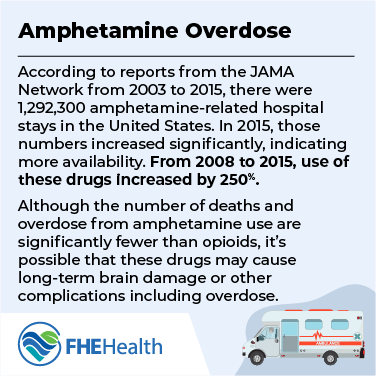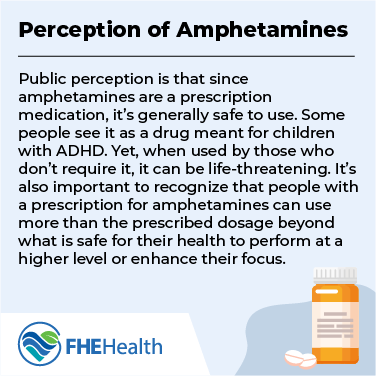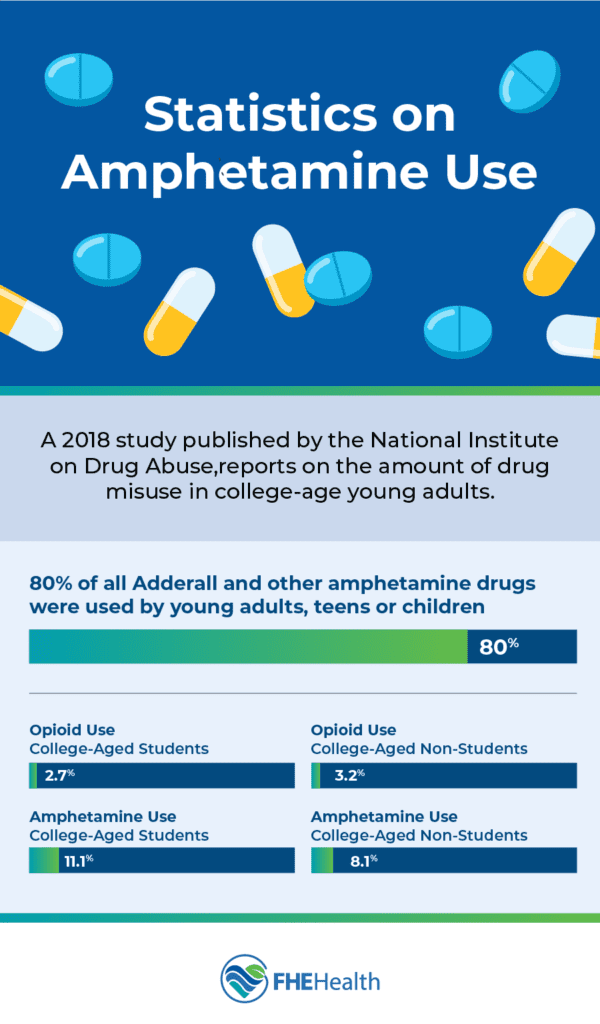Amphetamines are a type of stimulant. They speed up the way messages move through the brain and the body, creating a sense of elation and amplifying energy. They may be prescribed for the treatment of conditions such as attention deficit hyperactivity disorder and narcolepsy. However, some people take them illicitly, possibly leading to an increased number of deaths from amphetamine use.
Statistics on Amphetamine Use
Amphetamine statistics make it clear that more people are using these drugs than ever. Some studies, published in the U.S. National Library of Medicine, note that, from 2006 to 2016, there was a 2.5-fold increase in the use of these drugs in the United States. In 2006, 7.9 tons of the drugs were used, while in 2012, uses peaked at 19.4 tons. By 2016, it had fallen to 18.6 tons.
Another study, published by the National Institute on Drug Abuse, reports on the amount of drug misuse in college-age young adults. It found that, in 2018, the number of college students misusing drugs like Adderall, which is a type of amphetamine, was 11.1% of all enrolled students. By comparison, just 8.1% of all young people the same age but not in college used the drug. These studies also showed that college-aged men were more likely to use the drugs, with 14.6% reporting their use. In college-age non-students, 10.1% of females reported using the drug compared to just 5.3% of males.
While there is evidence to suggest that 80% of all Adderall and other amphetamine drugs were used by young adults, teens or children, anyone can use them. According to the Center for Young Adult Health and Development[1], 61.8% of college students were offered these drugs at some time during their school careers.
That same study looked at the use of opioids in college-aged young adults to compare its use to amphetamines. In 2018, the study found that just 2.7% of college-aged students used opioids of any type; that is a stark contrast to the reported 11.1% of users of amphetamines. Also, 3.2% college-aged non-students reported using opioids while, as noted, 8.1% reported using amphetamines. This suggests that amphetamines rank a bit higher in use across the board.
Who Is Using Amphetamines and Where?
Many people who use these drugs do so because they have a prescription for them. Use is more common in young people who have ADHD symptoms or other health ailments. However, the U.S. National Institute on Drug Abuse also notes that 1 in 9 people between the ages of 12 and 25 used prescription amphetamines for nonmedical reasons or misused them without a prescription at all. In short, many people who are using these drugs are not doing so because they need them for health treatment. The study also found that 25% of people who begin abusing these drugs did so by the age of 13.
The 2019 Monitoring the Future Study from the National Institute on Drug Abuse[3] found the following insights on young adult use of amphetamines:
- 4.1% of eighth-graders had used amphetamines in the last year.
- By 10th grade, 5.2% reported using them.
These rates are more than double that of opioid-related drug use in these age groups.
Amphetamine-Related Deaths
 Though the use of amphetamine in young adults is higher than that of other drugs, the number of deaths from amphetamine use and overdose are significantly fewer than opioids. While it’s possible that these drugs may cause long-term brain damage or other complications rather than death, they can cause overdose.
Though the use of amphetamine in young adults is higher than that of other drugs, the number of deaths from amphetamine use and overdose are significantly fewer than opioids. While it’s possible that these drugs may cause long-term brain damage or other complications rather than death, they can cause overdose.
According to reports from the JAMA Network[2] from 2003 to 2015, there were 1,292,300 amphetamine-related hospital stays in the United States. In 2015, those numbers increased significantly, indicating more availability. From 2008 to 2015, use of these drugs increased by 250%.
Global Reports of Amphetamine Use
No other country has a greater misuse of prescription drugs than the United States. However, there are data on the are risks associated with the drug outside of the country.
One example is the number of deaths associated with the use of amphetamine drugs in England and Wales. A study reported by Statista[4] looked at deaths from 1993 to 2018. In 1993, there were 37 deaths related to the use of this drug. By 2018, that number had grown to 100. There was a significant spike in use in 2013. Prior to that year, about 50 peopled on average died from the overuse of the drug each year.
Another study, published by Science Direct[5] noted a significant increase in the number of people using amphetamines dying from overdoses. It found that from 1987 to 2011, the number of people dying was significantly higher if they injected the drug, which isn’t a typical use.
Public Opinion and Perception
 When you look at these amphetamine statistics, including amphetamine facts on overdoses and deaths, it’s clear that this drug should be considered just as worrisome as other commonly misused drugs, including opioids and methamphetamine. Yet, it gets much less attention. Though amphetamine abuse statistics are far more difficult to determine because it’s a prescription medication, there is significant risk surrounding its use.
When you look at these amphetamine statistics, including amphetamine facts on overdoses and deaths, it’s clear that this drug should be considered just as worrisome as other commonly misused drugs, including opioids and methamphetamine. Yet, it gets much less attention. Though amphetamine abuse statistics are far more difficult to determine because it’s a prescription medication, there is significant risk surrounding its use.
Some of that could come from the perception that, as a prescription medication, it’s generally safe to use. Some people see it as a drug meant for children with ADHD and, therefore, can’t be that bad. Yet, when used by those who don’t require it, it can be life-threatening. It’s also important to recognize that people with a prescription for amphetamines can use more than the prescribed dosage beyond what is safe for their health to perform at a higher level or enhance their focus.
Health Care Costs Associated With Amphetamine Use
There’s limited clear data on how much amphetamine use and misuse in the United States costs the general public. However, reports published by the National Institute of Health[6] create a clear case of risk. In the western portion of the United States, Medicaid is the primary payer for these medications in prescription form. That makes it a public health concern, especially since 1.3 million people were hospitalized from 2003 to 2015 because of the misuse of the drug.
Finding Help for Amphetamine Addiction
For people misusing amphetamines, there is help available. You can turn to FHE Health for immediate help for any type of prescription drug misuse or illicit drug abuse. Contact our compassionate, experienced counselors by calling 833-596-3502 today.









